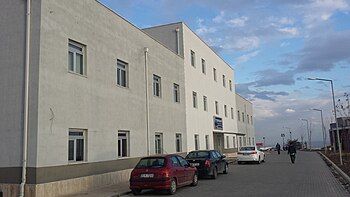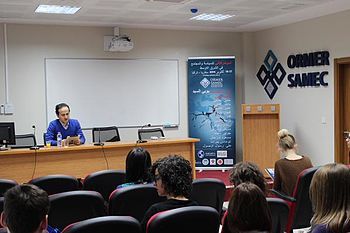Sakarya University Middle East Institute
 | |
| Abbreviation | ORMER |
|---|---|
| Type | Public |
| Location | |
Director | Kemal Inat |
| Affiliations | Sakarya University MESC Jordan |
| Staff | 10 full-time faculty members and 18 research assistants |
| Website | http://ormer.sakarya.edu.tr/ ORMER Website] |
Sakarya University Middle East Institute (Turkish: Sakarya Üniversitesi Ortadoğu Enstitüsü, also known as ORMER) is located on the campus of Sakarya University in Sakarya, Turkey.
History
[edit]The idea of Sakarya University Middle East Institute goes back to the year 2005 when the first issue of Middle East Annual (Ortadoğu Yıllığı) was published by a group of academics including the founding director of the institute, Kemal Inat. In the aftermath of the Arab Spring, this idea turned a concrete step with the opening of a master program on the Middle East under the Social Science Institute of Sakarya University in May 2012. At the same year, an online master program on the Middle East was also inaugurated. Those who opened Master-level programs organized the first Middle East Congress on Politics and Society between 9 and 11 October 2012.[1]
After the opening of another Middle East program at PhD level, the Center for Middle Eastern Studies at Sakarya University was established on 11 December 2013.[2] The main focus of the center was the effect of the Arab Spring on politics, society and economy of the Middle East. Accordingly, the second Middle East Congress on Politics and Society was organized in order to deal with effects of the Arab Spring on the Middle East.[3]

According to founding director of the institute, Turkey's need for academically-educated experts on the Middle East became a problem especially after two important political developments in the opening years of the 21st Century, rising interest of Turkey towards the Middle East region, and political turmoil following the Arab Spring.[4] Motivated by these political developments, the center reorganized itself as an institute. Therefore, Sakarya University Middle East Institute was officially established on May 25, 2015,[5] and all graduate programs and staff were transferred to this institute. However, the institute continues to use ORMER as its abbreviation. ORMER is a shortened form of Ortadoğu Merkezi (Middle East Center).
Activities
[edit]As part of its mission, Sakarya University Middle East Institute offers a variety of opportunities including conferences, lecture series, workshops, and outreach activities.[6] The institute also publishes booklets, detailed reports, policy briefs, and short commentaries on current affairs of the Middle East.
The main activity of the institute is to organize Middle East Congress on Politics and Society biennially. Prior to the establishment of the institute, this congress was organized firstly by Department of International Relations, Sakarya University in 2012. The second Middle East Congress on Politics and Society was organized by the Center for Middle Eastern Studies at Sakarya University in 2014.[7]

Periodicals
[edit]In addition to policy briefs, and short commentaries published in its web page on occasion, Sakarya University Middle East Institute is the editorial home to a peer-review academic journal and a peer-review academic annual, both of which focus particularly on the Middle East.
The Middle East Annual, (Turkish: Ortadoğu Yıllığı), published since 2005, covers political, economic and societal developments in each country of the Middle East.
Turkish Journal of Middle Eastern Studies (Turkish: Türkiye Ortadoğu Çalışmaları Dergisi),[8] published since 2014, is a peer-review academic journal.
Current staff
[edit]- Director: Tuncay Kardas
- Deputy Director: Yıldırım Turan and Nebi Miş
- Graduate Program Coordinator: Recep Tayyip Gurler
Previous Directors
[edit]Kemal Inat (2015 - September 2018)
References
[edit]- ^ "Middle Eastern Congress on Politics and Society Conference | Research Turkey".
- ^ "Başbakanlık Mevzuatı Geliştirme ve Yayın Genel Müdürlüğü". www.resmigazete.gov.tr. Retrieved 17 April 2023.
- ^ "II. Middle Eastern Congress (2014) | ORTADOĞU ENSTİTÜSÜ". Archived from the original on 17 November 2015. Retrieved 12 November 2015.
- ^ "Uzmanlar burada yetişiyor".
- ^ "25/5/2015 Tarihli ve 2015/7723 Sayili Kararnamenin Eki", Resmi Gazete, 2015, Available at: http://www.resmigazete.gov.tr/eskiler/2015/06/20150605-25-1.pdf
- ^ "Organization | ORTADOĞU ARAŞTIRMALARI MERKEZİ". Archived from the original on 16 September 2015. Retrieved 20 August 2015.
- ^ "I. Middle Eastern Congress (2012) | ORTADOĞU ARAŞTIRMALARI MERKEZİ". Archived from the original on 1 October 2015. Retrieved 20 August 2015.
- ^ "Turkish Journal of Middle Eastern Studies". Archived from the original on 19 December 2015. Retrieved 12 November 2015.
